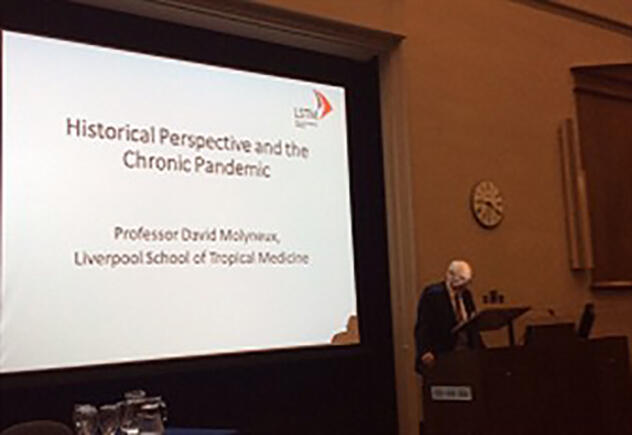
LSTM launched its extended Neglected Tropical Diseases programme today at an event entitled: “Addressing the Chronic pandemic of Neglected Tropical Diseases (NTD), the first decade and onwards”. Over 100 delegates attended, on what is the 10th anniversary of a meeting in Berlin where the term NTD was first coined.
Held at the Leggate Theatre in the University of Liverpool’s Victoria Gallery & Museum, the event was opened by LSTM’s Director Professor Janet Hemingway and included speakers from Glaxo Smith Kline, the World Health Organization (WHO), the Bill and Melinda Gates Foundation, speakers from national programmes in endemic countries and a number of speakers from LSTM. It was split into three major themes: A decade of NTD partnership; LSTM NTD – Research, Policy, Practice and LSTM NTD – The next decade and beyond… covering topics ranging from capacity strengthening and drug discovery to diagnostics and modelling as well as covering the main conditions researched at LSTM.
Of the 17 conditions classified as NTDs by the WHO, LSTM is involved in research into 14 of them. Professor Hemingway said: “It is estimated that over one billion people from the world’s most disadvantaged and poorest communities are affected by at least one NTD. In order to respond to the ambitious targets laid down in the London Declaration in 2012, LSTM has reorganised itself, focussing on a multidisciplinary approach to NTDs, building on the particular strengths of our research departments in order to overcome the existing barriers to NTD control and elimination.”
Leading and overseeing LSTM’s approach to NTD’s is Emeritus Professor David Molyneux, one of the world’s leading experts in the field of NTDs and he talked the delegates through the historical perspective of the conditions that significantly impact upon the physical and emotional wellbeing of some of the world’s poorest people. He began by looking at the early years of LSTM, charting the institution’s long history of research in the field of NTDs through to his own involvement at the Berlin meeting in 2005.
Professor Molyneux concluded by looking at the advances made in the last decade and the socio-political, climatic and biological challenges faced by programmes today. He said: “NTDs are a chronic pandemic having a debilitating impact on over a billion people and requiring effective, sustainable elimination and control programmes across the globe. Events like today help to foster the invaluable, international partnerships that are the cornerstone of the success of such programmes.”
Following the conclusion of the event, Dr Anarfi Asamoa-Baah, Deputy Director General of the WHO will deliver the Leverhulme Lecture, entitled “Public Health Challenges in the post-2015 era”
A booklet highlighting LSTM’s cross sectional expertise in NTDs can be downloaded from the sidebar.